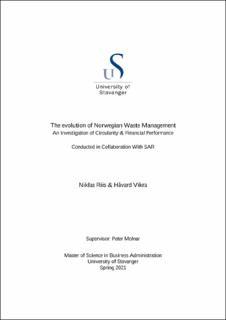| dc.description.abstract | Waste has over the years evolved from being seen as merely a burden, to being perceived as an integral part of a shift towards a sustainable and circular economy. This thesis provides an extensive description of this change, with specific focus on the Norwegian waste management industry.
As a high-income country, Norway has a high recycling rate compared to lower income countries. However, hazardous waste generation has inflated far faster than GDP and population the past decades. Hazardous waste is inherently complex to recycle, and as of today, difficult to combine with being profitable. As most of hazardous waste in Norway ends up at landfills, this spurred us on to examine if access to landfills had any effect on profitability.
The result from the regression fails to conclude that access to landfills have a statistically significant impact on financial performance, although the difference in means between the two groups came out significant. Thus, the results are not indicating a significant difference, but this could also be a consequence of a small sample size over companies with access to landfills. On the other hand, economies of scale prove to have a statistically significant impact on profitability in the waste management industry. | |
